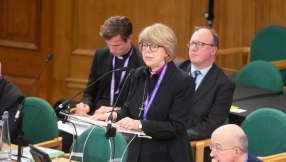Church leaders have written to the Government demanding an apology for "misrepresenting the poor".
They include the Bishop of Leicester, the Right Reverend Tim Stevens, and the Bishop of Bradford, the Right Reverend Nick Baines.
The letter expresses "grave concern" about recent instances of Government members giving "misleading and inaccurate information" about people on benefits.
One example they cite is Conservative Party chairman Grant Shapps stating on 30 March that 878,300 people had dropped claims to incapacity benefit "rather than completing a medical test" as evidence of the need for welfare reform.
"This gave the impression that those who withdrew their application had submitted false claims or feared that they would not be eligible for benefit if tested, something that was repeated in media interviews," the letter reads.
"In fact, the figure refers to every time an individual stopped claiming ESA during the assessment period since October 2008. Many of these claims were for short-term problems; others finished when a partner's income increased, removing them from eligibility. There is no evidence that people withdrew their applications 'rather than' undergo a medical test, which it is implied that they would have failed."
Other signatories of the letter include the President of the Methodist Conference, Reverend Dr Mark Wakelin, Convener of the Church and Society Council of the Church of Scotland, the Reverend Sally Foster-Fulton, Faith and Society team leader at the Baptist Union of Great Britain (BUGB), the Reverend Stephen Keyworth, and national coordinator of Church Action on Poverty, Niall Cooper.
The letter asks the Government to correct inaccuracies in the representation of poor people and offer an apology.
"We are concerned that these inaccuracies paint some of the most vulnerable in our society in an unfavourable light, stigmatising those who need the support of the benefits system," the letter states. "No political or financial imperative can be given to make this acceptable."
The Churches say that although their views on welfare reforms differ, they are united in the belief that the debate around the reforms "should be based on truthful information".
"As Christians we believe that all people are made in the image of God, and as such are to be loved and valued. At the very least, the most vulnerable deserve to be spoken of truthfully and with respect."
They conclude: "We ask you, as Prime Minister and as leader of the Conservative Party, to ensure that the record is put straight, and that statistics are no longer manipulated in a way which stigmatises the poorest in our society. We promise to support you in efforts to ensure that debates on poverty are rooted in fact and not on assertion."
The letter follows similar criticisms in a joint report by BUGB, the Methodist Church, the United Reformed Church and the Church of Scotland, which was sent to MPs earlier in the year. The report accused the media and politicians of manipulating and misusing statistics to support the belief that the poor deserve their poverty and therefore deserve benefit cuts.













